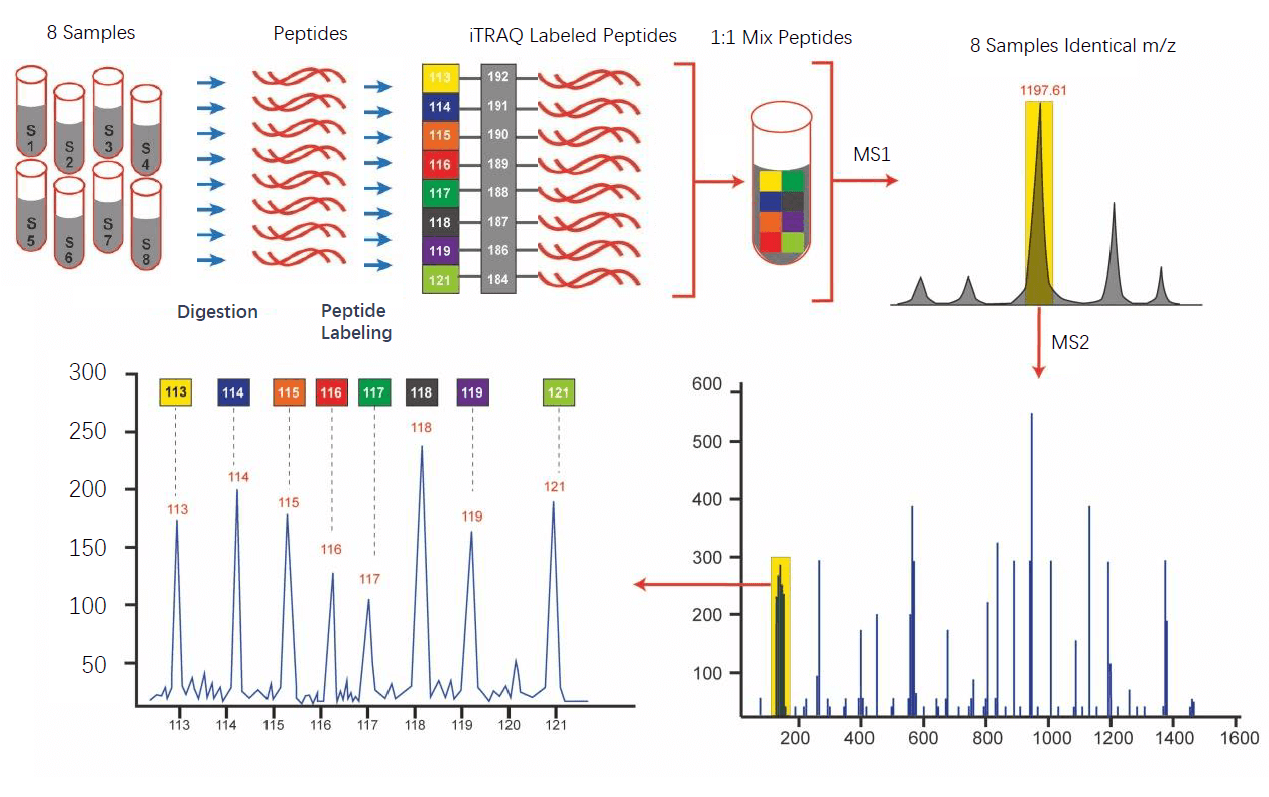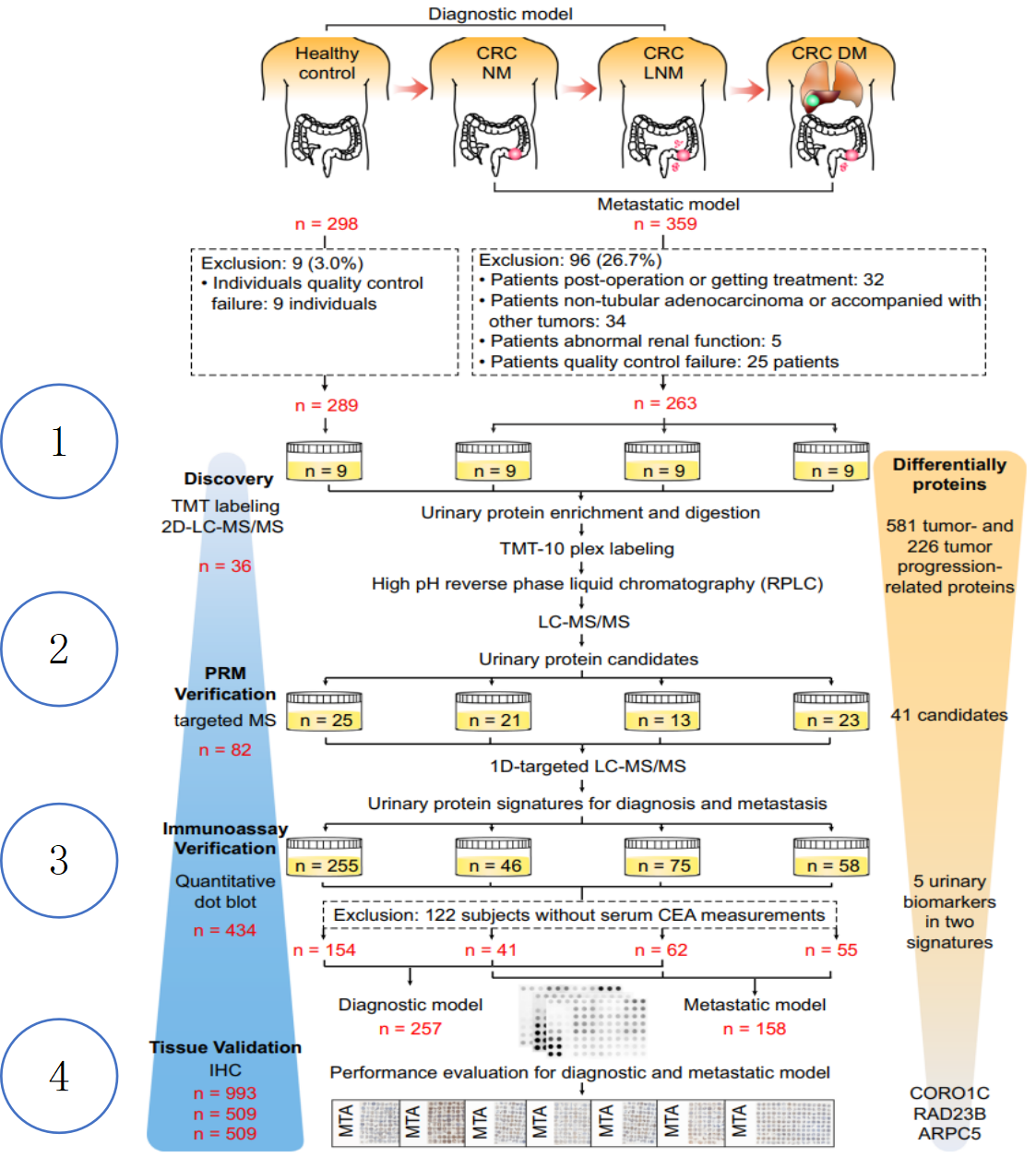TMT Labeling Proteomics Analysis Service
The fundamental principle of TMT labeling proteomics involves extracting proteins from samples and digesting them into peptides, followed by labeling the peptides with TMT reagents containing different isotopes. The labeled peptides are then analyzed using liquid chromatography-tandem mass spectrometry (LC-MS/MS). In the mass spectrometer, the peptides are separated based on their mass-to-charge ratio (m/z) during the first round of mass spectrometry (MS1). Specific peptide ions are selected for fragmentation, and the resulting fragments are detected in the second round of mass spectrometry (MS2). Simultaneously, the TMT-labeled mass reporter groups release unique mass signals. By analyzing the intensity of the mass reporter signals in the MS2 spectrum, the relative abundance of the corresponding peptides across different samples can be quantified. TMT labeling proteomics analysis service allows for the simultaneous quantification of proteins across multiple samples in a single experiment, enabling the identification of differential proteins and facilitating multi-sample comparisons, thereby significantly enhancing experimental efficiency and sample throughput.
Leveraging the high resolution and sensitivity of mass spectrometers, TMT labeling proteomics analysis service can accurately quantify both low- and high-abundance proteins in samples, offering high sensitivity and a wide dynamic range. With its high-throughput and high-precision quantification capabilities, TMT technology is widely applied in differential protein expression analysis. It is a powerful tool for studying protein expression differences, protein function, and the regulation of biological processes.

Figure 1. Principle of TMT Quantitative Proteomics Technology.
Services at MtoZ Biolabs
MtoZ Biolabs is committed to providing professional quality control and project validation services for the biological, pharmaceutical, and medical device industries. By leveraging state-of-the-art sample preparation instruments (including cell disruptors, tissue grinders, and homogenizers) and ultra-high-performance liquid chromatography coupled with high-resolution mass spectrometry (Orbitrap Exploris 240 & Orbitrap Exploris 480 with FAIMS Pro), MtoZ Biolabs has established TMT labeling proteomics analysis service platform. This platform enables efficient protein extraction and specific peptide enrichment at the TMT-labeled proteomics level.
Service Advantages
1. Advanced Analytical Platform
MtoZ Biolabs provides an end-to-end solution, including kit-based, high-throughput sample preparation, automated microfractionation, high-performance mass spectrometry acquisition, and a professional data analysis and quality control platform. This ensures reliable, fast, and highly precise analytical services.
2. Transparent Pricing
Our pricing is transparent, with no hidden or additional fees.
3. High-Quality After-Sales Support
From signing the contract to receiving samples, starting experiments to completing the report, and if there are any doubts about the report or experimental data within three years of completing the report, the after-sales service is available 24 hours a day to solve any problems related to the project at any time.
4. Customized Research Solutions
MtoZ Biolabs offers tailored services to address unique research questions and experimental requirements.
Sample Submission Suggestions
1. Sample Types and Recommended Amount
(1) Animal Tissue (e.g., brain, heart, liver, spleen, lung, kidney, muscle, skin): 30–60 mg
(2) Plant Tissue (e.g., leaves, flowers, grasses, algae, ferns, fungi): 100 mg–1 g
(3) Body Fluids (e.g., serum/plasma): 50–100 μL
(4) Cell Samples (e.g., suspension/adherent cultures): 1×107 cells, preferably with backups
(5) Microorganisms (e.g., bacteria, fungi): 50–100 mg
(6) Exosomes (isolated exosomes): 100 μg–1 mg
(7) Others (e.g., cell supernatants, fermentation broths, urine): 5–10 mL
Note: If you have specific requirements or need assistance with sample preparation, please contact us.
Applications
1. Agriculture and Forestry
Studies on stress resistance mechanisms, growth and development, and breeding protection.
2. Animal Husbandry
Research on meat and milk quality, as well as pathogenic mechanisms.
3. Basic Medicine and Clinical Diagnosis
Biomarker discovery, disease mechanisms, disease subtyping, and personalized therapies.
4. Biopharmaceuticals
Investigations of drug mechanisms of action, efficacy evaluations, and drug development.
5. Microbiology
Studies on pathogenic mechanisms, drug resistance, and pathogen-host interactions.
6. Marine and Aquaculture
Research on fisheries resources, seawater aquaculture, and environmental and food safety in fisheries.
7. Bioenergy and Environmental Sciences
Optimization of fermentation processes, biofuel production, and environmental risk assessment.
Case Study
1. Using TMT Proteomics and PRM to Identify and Validate Biomarkers for Colorectal Cancer (CRC)
This study implemented a phased discovery-confirmation-validation process using 657 urine samples and 993 tissue samples from healthy controls and colorectal cancer (CRC) patients with a significant risk of metastasis. Initially, TMT proteomics was conducted on the urine samples, identifying differentially expressed proteins associated with CRC (581 diagnostic proteins and 226 metastatic proteins). Subsequently, PRM (parallel reaction monitoring) was employed for targeted confirmation, successfully validating 41 proteins. This process identified three urinary biomarker panels for CRC diagnosis and four urinary biomarker panels for stratifying metastatic risk. Finally, tissue microarrays were utilized to verify whether changes in urinary protein biomarkers reflected variations at the tissue level. For three diagnostic proteins, tissue validation demonstrated that elevated urinary protein biomarkers corresponded to changes in tissue expression. This case highlights the utility of TMT labeling proteomics analysis service in exploring protein expression changes under different conditions, offering deeper insights into the relationship between protein expression and physiological regulation mechanisms in the body.

Sun, Y L. et al. Nature Communications, 2022.
Figure 2. Study the Overall Workflow of the Sample Income and Exclude Standards.
Deliverables
1. Experimental Procedures
2. Mass Spectrometry Parameters and Images
3. Raw Data
4. Protein Differential Level Analysis
5. Bioinformatics Analysis
6. Customized Data Analysis
(1) Standardized Data Analysis: Protein identification, quality control analysis, differential expression analysis, and multi-group comparative analysis.
(2) Advanced Data Analysis: Functional analysis, drug target annotation, biomarker screening, and integration with clinical characterization.
Note: For special requests or customized data analysis requirements, please contact us.
MtoZ Biolabs, an integrated Chromatography and Mass Spectrometry (MS) Services Provider, provides advanced proteomics, metabolomics, and biopharmaceutical analysis services to researchers in biochemistry, biotechnology, and biopharmaceutical fields. Our ultimate aim is to provide more rapid, high-throughput, and cost-effective analysis, with exceptional data quality and minimal sample consumption. Free project evaluation, welcome to learn more details!
MtoZ Biolabs, an integrated chromatography and mass spectrometry (MS) services provider.
Related Services
SILAC (Stable Isotope Labeling by Amino Acids in Cell Culture)-Based Quantitative Service
How to order?







